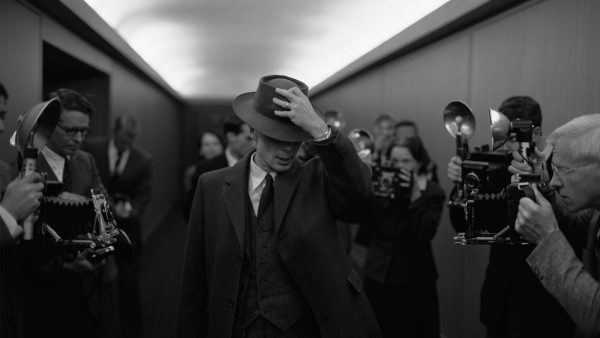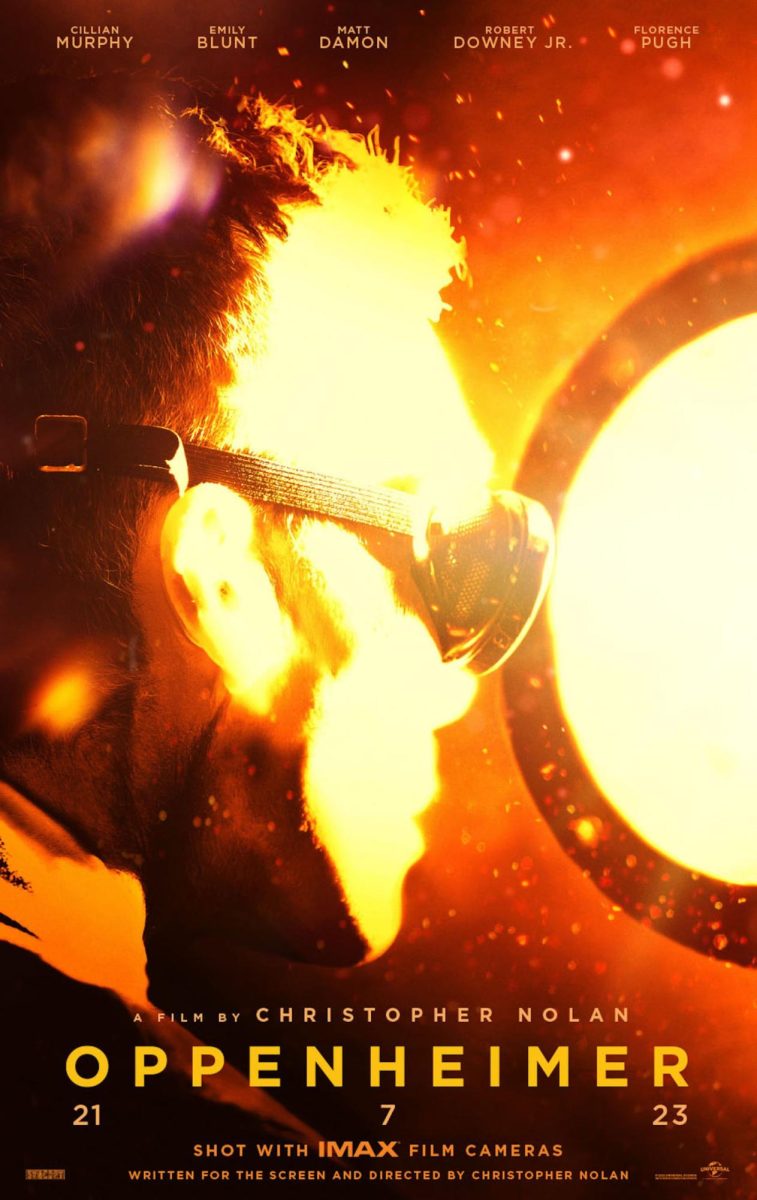It’s no secret that in the hugely popular “Barbenheimer” trend, “Oppenheimer” is not the star. Despite the conversation around the dual release of the films, many I have spoken to have told me they only intend to see “Barbie.” Those who are attending the double feature tell me they wouldn’t have seen “Oppenheimer” if it weren’t for the viral phenomenon. While understandable, it’s frankly disappointing because “Oppenheimer” is one of the best films of the year.
“Oppenheimer” follows the life and tribulations of American scientist J. Robert Oppenheimer and his work in creating the atomic bomb.
A Complicated Life On Screen
Despite its prominence in the background of the main poster, “Oppenheimer” is not a film about the atomic bomb. As the title states, it’s about the man who made it. Audience members walking into this three-hour biopic should not expect a film that is just building to a large explosion. While the Trinity test is an important moment in the film, what it is as a whole is a detailed portrait of a complicated man struggling with choices.
Director Christopher Nolan invites the viewer to dive head-first into the vast yet deeply broken psyche of Oppenheimer and sit with him in his highest highs and his lowest lows. This intensely complex man would not be portrayed with such elegance and precision if it weren’t for the actor playing him, Cillian Murphy. Though Murphy has been in films for years, this is really the first time he’s been able to take center stage. Murphy along with Nolan’s masterful screenplay, never forces the audience to feel a specific way about Oppenheimer. Every feeling, thought and choice is captured and shown letting viewers choose moment by moment how they want to feel. Although a large undertaking, Murphy took this layered figure and painted a complete human who you can hate, pity and be astonished by all at the same time.
The rest of the cast is absolutely stacked, featuring A-list actors in roles that are on screen for less than five minutes including Rami Malek, Casey Affleck and Emily Blunt as Oppenheimer’s wife, Kitty. Nolan strategically places Blunt in the background of important moments in Oppenheimer’s life, almost like a human representation of the scientist’s carelessness for family and personal relationships. Blunt steals these scenes, bringing a harsh, personal reality to the epic stakes of the film. I would not be surprised if a moment with her toward the end of the movie is shown at the 2024 Academy Awards. Another exceptional performance is that of Robert Downey Jr. as Lewis Strauss. Downey plays an all too familiar individual as a powerful man who has let feelings and envy infect his professional life. Downey performs a tightrope act, appearing formal but hiding a mind of conniving intentions. I haven’t been taken this much by a performance from Downey since watching the 2005 film “Kiss Kiss Bang Bang.”

An Experience Unmatched
For quite a while, Nolan has been one of the main purveyors of the “theatrical experience,” especially in the realm of IMAX. With “Oppenheimer”, Nolan takes his direction and cinematography to its fullest potential capturing the story in various aspect ratios, color compositions and angles to heighten the emotion of each scene. Despite almost entirely being scenes of discussions in rooms, Nolan and the director of photography, Hoyte Van Hoytema, shoot in a way that keeps the viewer locked into the intensity of each conversation and movement.
When the film does shoot for spectacle, such as the previously mentioned Trinity test sequence, the magic of cinema is in full effect. The shots, editing, sound and music all come together to create truly transcendent moments of pure, unfiltered feeling. Speaking more on the music, composer Ludwig Göransson produces a symphony of diverse pieces reflecting the quiet moments of contemplation and the bombastic sequences of grandeur. “Oppenheimer” is the type of film that gives the audience a glimpse at the gears behind movie magic.
There’s no masking what “Oppenheimer” is: a dense, talky re-telling of history. Though, Nolan often made the long, complicated conversations of the characters as tense as a high-octane car chase. Even I found myself drifting from the narrative at times. Nolan, like with most of his films, expects the audience to constantly be thinking and reflecting on the ideas “Oppenheimer” presents. It creeps into the darkest depths of the universe, showing the consequences of our own determination and what happens when great knowledge falls into the hands of powerful people. Our prospects of victory or achievement can often cloud the harm of our work, but when the dust clears, the world will switch on a dime in how they see those achievements. And like with any great discovery, Pandora’s Box comes into full effect once you realize there’s no erasing the memory of something world-changing.
At the beginning of the “doomed humanity” domino chain we will always find ourselves. If the last four sentences were boring and felt like too much to you, there’s a high likelihood you will not enjoy “Oppenheimer.” However, if those ideas are something you wish to climb further into, this film will be three of the most engrossing hours of your life.



